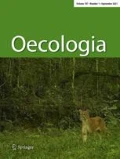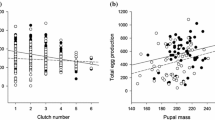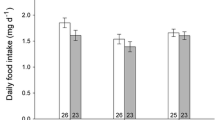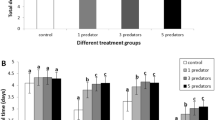Abstract
I studied effects of stress factors like food shortage, non-lethal predator presence and autotomy on survival and larval performance (growth rate, development rate and developmental stability) of larvae of the damselfly Lestes sponsa. In a laboratory experiment, larvae were raised during their last two instars at two food levels (high or low) crossed with two levels of autotomy (caudal lamellae present or absent). These treatments were nested within three levels of predation risk (Aeshna cyanea absent, Chironomus-fed caged Aeshna or Lestes-fed caged Aeshna). The diet of the predator had no effects. The low food level and the presence of Aeshna independently increased mortality rates of L. sponsa larvae. The low food level, presence of a caged Aeshna and autotomy all independently reduced growth rate (mass and body size at day 40) and wing size at emergence, and the first two stress factors also reduced development rate. Regardless of predator presence and autotomy, all damselfly larvae consumed the food available. This indicated that the predator-induced stress effects were not due to reduced food uptake, but probably reflected lowered assimilation efficiency and/or a higher metabolic rate. Besides a low food level, the presence of caged Aeshna predator larvae and autotomy also increased hind wing asymmetry. This result demonstrated that predator-induced stress may reduce developmental stability in the prey.
Similar content being viewed by others
Author information
Authors and Affiliations
Additional information
Electronic Publication
Rights and permissions
About this article
Cite this article
Stoks, R. Food stress and predator-induced stress shape developmental performance in a damselfly. Oecologia 127, 222–229 (2001). https://doi.org/10.1007/s004420000595
Received:
Accepted:
Published:
Issue Date:
DOI: https://doi.org/10.1007/s004420000595




